Two sales reps walk into the office. (No, this isn’t the start of a joke — we promise.)
One has two years’ experience and has been with your company that whole time.
The other has decades of experience but joined a few months ago and has only recently completed their onboarding.
Companies need to develop personalized sales training programs for their sales teams at scale so they can achieve and maintain sales excellence across the organization. Otherwise, companies will see their sales teams living out the 80/20 rule, with the top 20% of their reps delivering 80% of their revenue and the rest of the team underachieving.
This blog is your guide to developing a sales training program that you can easily personalize for each rep — no matter the size of your sales team.
Given their different skills, knowledge, and experience, does it make sense for them both to go through the same sales training program?
Ad hoc sales training
Personalized sales training
- One-size-fits all
- Sporadic approach to training
- Some reps benefit from your training
- Low impact on overall team performance
- One-and-done approach to training
Personalized to the needs of individual reps
Ongoing approach to developing skills
All reps benefit from tailored training
Impact on overall team performance
Training is supported by reinforcement
Define excellence for your sales team
Your reps need to master the right skills, knowledge, and behaviors if they’re going to successfully hit quota every month. Of course, you can train and coach reps to help them develop those abilities, but only if you’ve worked out what they need to learn.
Identify the skills and behaviors that correlate with positive sales outcomes. Then, use these to create an ideal rep profile (IRP) that documents the skills, knowledge, and behaviors your sales reps need to succeed. An IRP can be modeled on your top performers or based on competencies and skills you want to encourage in your sales team but don’t yet see in action.
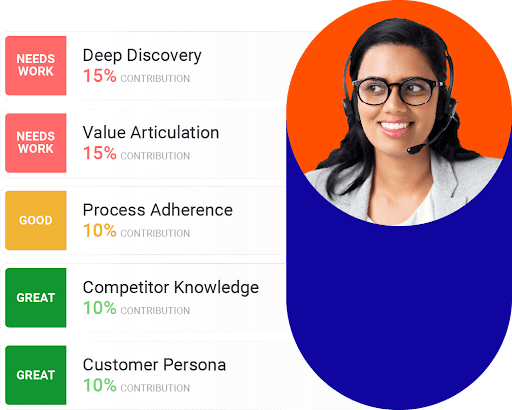
Your IRP will combine product and industry knowledge, sales skills, and communication behaviors to build a detailed list of the competencies that will enable your reps to meet (or exceed) quota and improve their win rates. For example, you may want your sellers to excel at:
- Using consistent product messaging on sales calls
- Handling prospect objections effectively
- Tailoring product demos to prospects’ needs or areas of concern
- Using minimal filler words on calls so they sound confident
- Getting the right balance of talk time and listening time, so they don’t dominate conversations with prospects
The examples in this list are some skills and competencies that make for a successful sales rep. But by looking at your recent deals, product, and reps’ skills, you can build out a more granular ideal rep profile that’s specific to your company and products.
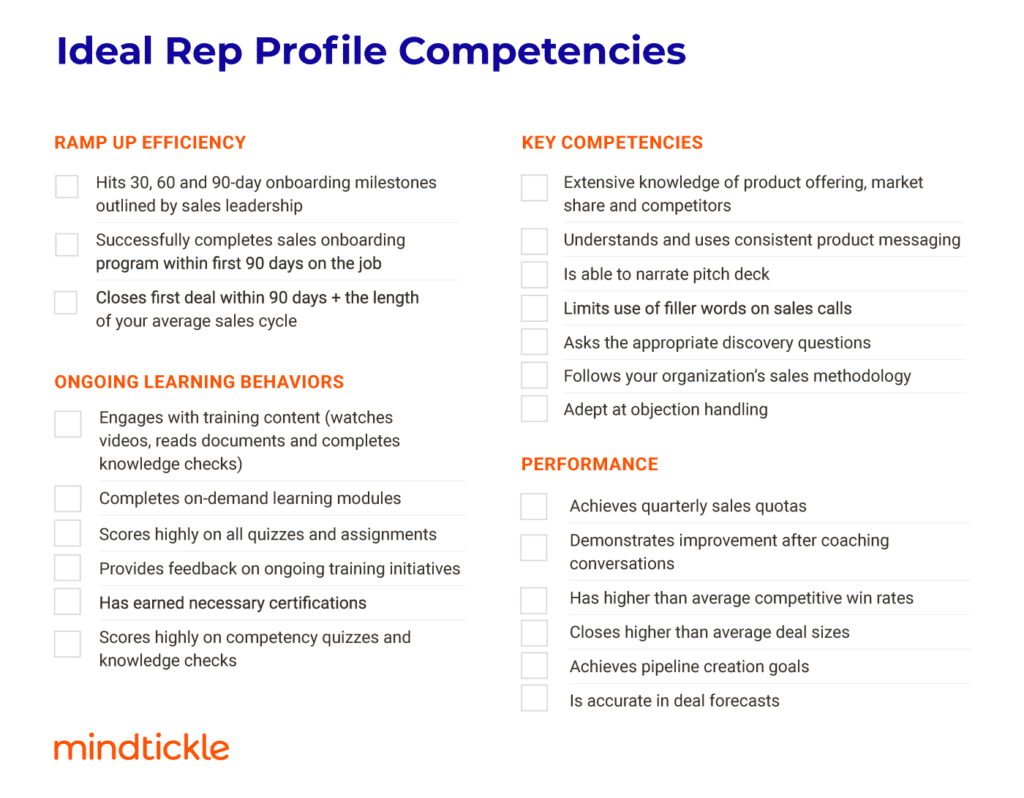
Define the outcomes for each sales training program
Once you’ve mapped out the IRP that your organization needs to succeed, you can plan out courses and programs that focus on each area. Start by defining the outcomes for each training program. The outcomes should align with the core skills, knowledge, and behaviors laid out in your IRP. For example:
- Knowledge-based training programs based on role or different product features help reps manage the sales cycle and run product demos tailored to prospects’ needs
- Behavior training programs help reps spot when they’re using filler words so they can reduce the frequency of using them on calls
- Skills training programs on common objections help reps handle prospects’ objections confidently
Identify reps’ personalized sales training needs
Your sellers all have different levels of experience, skills, and knowledge gaps, which means they’ll get more out of personalized training programs than a one-size-fits-all training session. On small sales teams, managers may be able to assess their reps’ training needs by manually reviewing their work and listening back to their calls on a regular basis. But in large or fast-growing companies, managers can’t be as hands-on with their reps’ ongoing performance.
Instead, you can use technology to monitor performance, recording and analyzing customer calls and other interactions to understand how each rep conducts themself in real-world selling scenarios. A conversational intelligence tool like Mindtickle’s Call AI analyzes all your team’s sales conversations to identify skills and behaviors that need improvement, such as their tone, talk time, and use of filler words.
It’s easier to personalize training for your reps if you have multiple courses that map to different competencies rather than a single sales masterclass or lots of ad-hoc training activities without an overarching strategy.
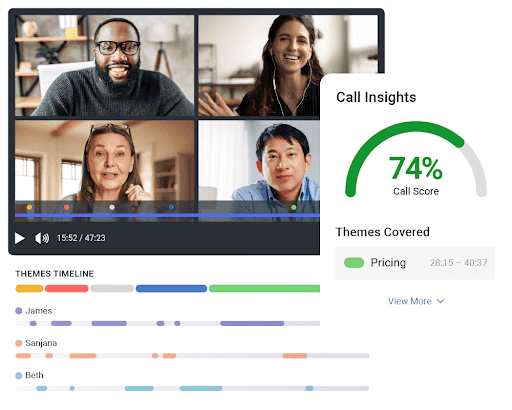
You can use that data to compare each rep’s skills, knowledge, and competencies against the standards set out in your ideal rep profile. This will help you identify areas where each rep excels and where they need to focus on improving.
Greg Myers, regional VP of sales at Turing Video, explained how Mindtickle helps him identify opportunities for his sellers to improve their messaging. “I can’t spend my entire workday listening to every single recorded meeting conducted by our sales reps, but it’s still important that I make sure their conversations are productive and on message,” he said.

You can use the insights from call recordings and analysis to identify the key skills and knowledge each rep needs to develop. Identifying the skills gaps of each rep means you can determine the training programs that are most relevant to each person and will have the biggest impact on their work.
Topics for of sales training
- Competitive intelligence
- Sales methodology
- Sales tools
- Sales cycle processes
- Product releases
- Messaging & positioning
- Onboarding
- Campaign enablement
- Marketing reports & resources
- Pricing & packaging
Create a library of sales training materials
The most successful sales training programs combine self-guided learning with coaching to allow reps to learn the theory and then put it into practice. You need a library of training materials in different formats — educational content and interactive exercises — for sellers to work through for the self-guided part of their programs.
Your training library should include materials to help reps develop across all the areas defined in your ideal rep profile. Resources could include:
- Datasheets on different product features
- Video courses covering core skills like sales prospecting or outlining the different stages of your company’s sales process
- Quizzes to recap courses reps have already reviewed to improve information retention through spaced reinforcement
Work with experts across your organization to build out training materials for your sellers. While sales training or enablement leaders may feel like they need to produce all the content themselves, they should engage other team members instead.
Your product team is an expert in that area, so they should help with modules about different features. Your marketing team can help you develop training on key messaging to help ensure there is consistency when sellers talk with prospects. And sales managers can help you put together courses to help reps learn about your sales process or ideal customer profile.
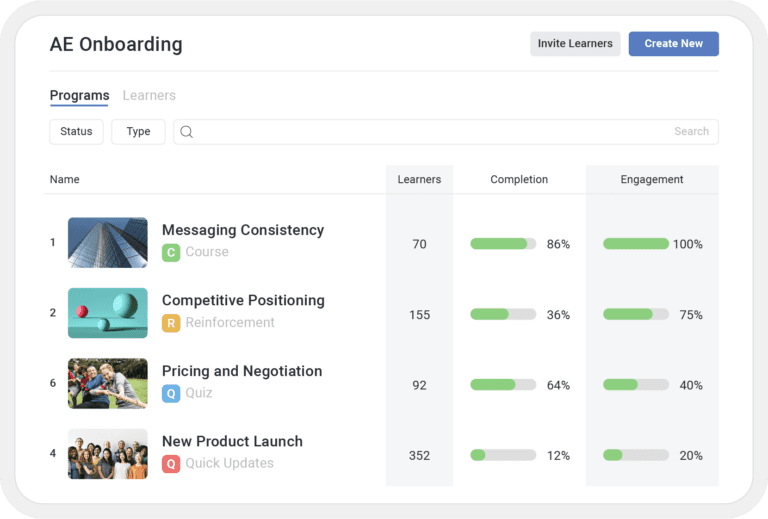
Using a revenue productivity platform like Mindtickle, you can set up a centralized content library in your sales content management system. You can build programs for different skills and topics, and your sellers can work through the programs that are most relevant to them. It is important that you can easily manage training content at scale, one where you can update or replace resources in just a few clicks.
Add dedicated sales coaching to self-guided learning
Traditionally, sales training has meant one-to-one coaching, where reps receive in-person training from their managers. But, in large organizations, remote companies, or fast-growing sales teams, your sales manager will become the bottleneck that holds back reps’ development because they don’t have enough time to train their teams and work toward the company’s revenue targets.
Technology like Mindtickle can help scale up your training and sales coaching by enabling reps to practice skills and sales scenarios on their own in a low-stakes environment. For example, they can complete virtual role-plays and record practice demos or training exercises on common sales scenarios like objection handling. Then they’ll receive AI-powered recommendations on their tone, length, pacing, and use of filler words to coach them on behavioral best practices.
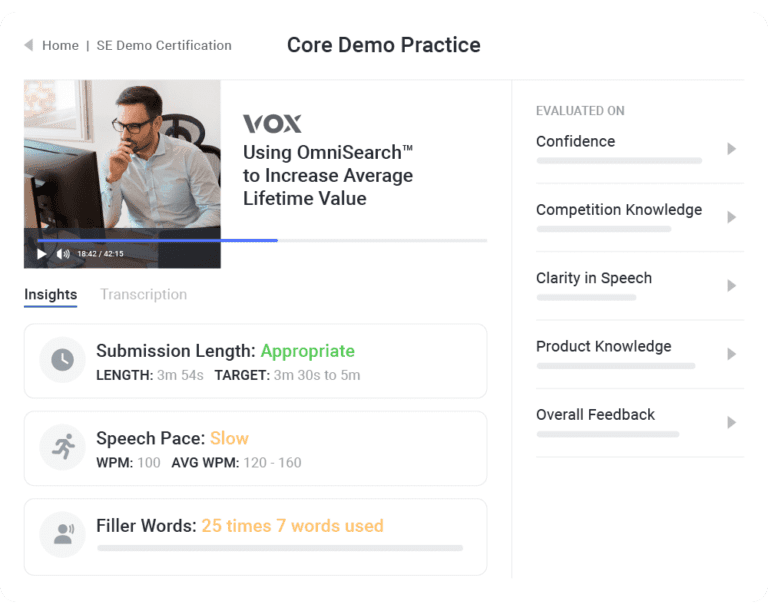
The rep’s manager can then analyze their performance to identify skills and knowledge gaps without spending (at least) 30 minutes per rep watching their practice demo. After this analysis, the manager can compare the rep’s skills against the IRP. Then they can recommend specific training exercises or modules from your training library to any areas of weakness.
Sally Cox, instructional designer, global field enablement at Splunk, explained how using Mindtickle has helped them tailor coaching and training materials for their sales reps: “Managers can now create their own coaching content faster and personalize it to fit the specific needs of their reps.” Using technology to add coaching alongside self-guided learning makes it easier for managers to personalize training recommendations for their sales reps at scale.
Create ongoing training and coaching opportunities
Your sales training program shouldn’t just focus on teaching sellers new skills and sharing new information. If it did, you could get away with offering training once a quarter or on an ad-hoc basis. But sales reps need to have their skills, knowledge, and competencies regularly reinforced to ensure they retain important information and align with your company’s core messaging.
Companies need to think of sales training as a continuous process — something we here at Mindtickle call sales everboarding. The strongest sales teams (where all reps perform well rather than having a couple of top performers) have a culture of ongoing skills development and improvement through regular training and coaching.
You can develop a team culture of continuous improvement by providing ongoing training and coaching opportunities for reps and managers. Using a conversational intelligence tool like Call AI, you can analyze all your reps’ calls and sales interactions and automatically identify training opportunities and skills gaps. Managers can then recommend training programs and modules on an ongoing basis to help their reps improve.
You can also engage sellers with ongoing microlearning activities like live challenges and quizzes. These help reps improve information retention with spaced reinforcement and break their refresher training into bite-size chunks. And with an element of gamification, you can encourage some healthy competition between your reps to increase participation in your sales training.
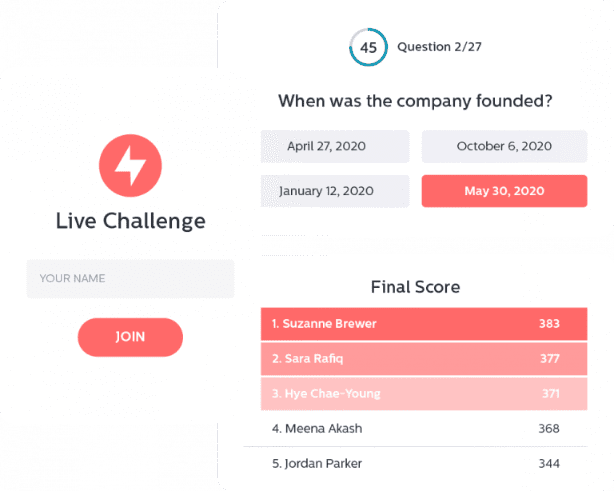
Rethink traditional sales training with sales readiness
A structured sales readiness program is the best way for companies to change their traditional approach to sales training. The five-step framework encourages teams to pursue a continuous state of excellence across the whole sales organization by:
- Defining excellence
- Building knowledge
- Aligning content
- Analyzing performance
- Optimizing behavior
Instead of only providing reps with training during onboarding (plus your annual kick-off meetings), sales readiness creates a culture of learning through everboarding. By making training an ongoing process rather than an occasional investment, your sales team is always at its peak and ready for those high-value conversations with prospects.
Sales reps continually build knowledge through spaced reinforcement training exercises and microlearning activities tailored to areas where rep proficiency looks weaker. Then sales teams use AI-driven conversational intelligence to analyze reps’ performance on an ongoing basis. This enables reps (and their managers) to identify opportunities for improvement, where they can optimize skills and behavior with further personalized training.
Prioritizing sales readiness activities helps companies create a culture of sales excellence for their whole team, raising performance levels for all their reps, not just the historic top performers.
Build winning behaviors in your sales team with the help of Mindtickle
Personalized sales training programs help to set all your reps up for success and maintain a state of sales readiness. Mindtickle enables companies to move away from the cookie-cutter approach to sales training. Instead, you can build sales training programs that can be personalized to the needs of each individual rep — no matter how big or small your sales organization.
Personalize Your Sales Training
See how Mindtickle helps you build and scale your sales training program.
Request a DemoThis post was originally published in February 2022 and updated in November 2023.

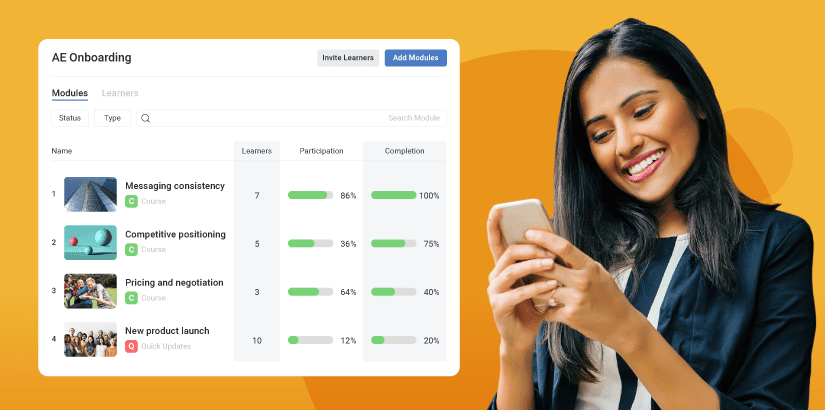

 By Poornima Mohandas
By Poornima Mohandas
